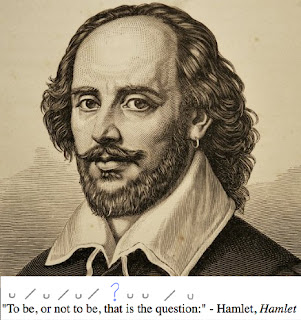Love's Labor's Lost: a Forgotten Treasure
Love's Labor's Lost is one of Shakespeare's earliest comedies; scholars believe it was written in the 1590s for Queen Elizabeth. The earliest surviving copy of the play is a 1598 quarto. Love's Labor's Lost is often not considered one of Shakespeare's greatest works. However, the text of the play shows the mark of a great wordsmith. We'll look at some examples of Will the Wordsmith's work––but first a quick review of the play.
The Characters
King Ferdinand of Navarre
Berowne, Longaville, and Dumaine: lords attending the King
Princess of France
Rosaline, Maria, and Katherine: ladies attending the Princess
Boyet: a lord attending the Princess
Monsieur Marcadé: a messenger
Don Adriano de Armado: a Spanish soldier
Moth: his page
Holofernes: a schoolmaster
Nathaniel: a curate (which means a member of the clergy)
Anthony Dull: a constable
Costard: a clown
Jacquenetta: a dairymaid
A forester
Attendants of the Princess and the King
The Plot (an executive summary)
The King and his three lords pledge to avoid any contact with women, but each man soon falls in love with each of four women newly arrived: the Princess and her three ladies. The King loves the Princess, Berowne loves Rosaline, Longaville loves Maria, and Dumain loves Katherine.
In the meantime, Don Armado tells the King that Costard has been spending time with Jacquenetta. Since the King's no-women pledge, this is strictly against the rules. Costard is sent to Don Armado, who (also in love with Jacquenetta) writes a love letter and asks Costard to deliver it to the dairymaid.
Through a combination of eavesdropping, poetry writing, and Costard's tricky letter-swapping, the four men accidentally reveal to each other that they are in love. The men decide to go the ladies' camp dressed as Muscovites.
The ladies decide to have their own fun and get back at the men for their dress-up games. They disguise themselves and act like each other, so that the men all profess their love to the wrong women. After chaos and confusion, their identities are revealed.
The men and the women watch a play. Soon, the lords and ladies are betrothed. However, bad news spoils the merriment: the Princess' father has died, and she must ascend to the throne.
The men swear their fidelity to the women; however, the women doubt their true intentions and force the men to wait. The Princess and her 3 attendants depart, and the King and his 3 lords are left to an uncertain future. The ending is unexpected and somber for such a play filled with ridiculous comedy.
The Wordplay
Now for the best part!
1) "Pretty and apt.
How mean you, sir? I pretty and my saying apt, or I apt and my saying pretty?
Thou pretty, because little.
Little pretty, because little. Wherefore apt?
And therefore apt, because quick.
Speak you this in my praise, master?
In thy condign praise.
I will praise an eel with the same praise.
What, that an eel is ingenious?
That an eel is quick. I do say thou art quick in answers."
– Armado and Moth (I.2.19-29)
Very early in the play, Shakespeare shows the audience to expect quick wit. This conversation between Don Armado and his page Moth is a quintessential example of wordplay. The lines are short and snappy. Moth borrows words from Armado and spits them back at him, and vice versa. It's almost like a game of tennis, where the ball is flying back and forth.
2) "Did not I dance with you in Brabant once?
Did not I dance with you in Brabant once?
I know you did.
How needless was it then
To ask the question!
You must not be so quick.
'Tis long of you that you spur me with such questions.
Your wit's too hot, it speeds too fast, 'twill tire.
Not till it leave the rider in the mire.
What time o'day?
The hour that fools should ask.
Now fair befall your mask.
Fair fall the face it covers.
And send you many lovers.
Amen, so you be none.
Nay, then will I be gone."
– Berowne and Rosaline (II.1.114-127)
Here, Shakespeare takes the wordplay we saw in the last quote to the next level. Rosaline says Berowne's words back to him verbatim (intonation the only difference), and both rhyme with each other. Once again, the short lines suggest rapid-fire dialogue between the two soon-to-be lovers.
3) "He draweth out the thread of his verbosity finer than the staple of his argument. I abhor such fanatical phantasimes, such insociable and point-device companions, such rackers of orthography, as to speak 'dout' sine 'b', when he should say 'doubt', 'det' when he should pronounce 'debt': d, e, b, t, not d, e, t. He clepeth a calf 'cauf', half 'hauf'; neighbour vocatur 'nebour', neigh abbreviated 'ne'. This is abhominable , which he would call 'abominable'. It insinuateth me of insanie. Ne intelligis, domine? To make frantic, lunatic."
– Holofernes (V.1.16-25)
This is an excellent comedic example of...not quite wordplay, but sound-play. Holofernes' fuddy-duddy and self-ignorant character comes out through his ironic criticism of those who, according to him, mispronounce words.
4) "They have been at a great feast of languages and stolen the scraps." – Moth (V.1.35-36)
Shakespeare's self-awareness shines through in this quote, even more than the others. He reminds us that Love's Labor's Lost is full of comedic wordplay.
5) "'Veal', quoth the Dutchman. Is not veal a calf?
A calf, fair lady.
No, a fair lord calf.
Let's part the world.
No, I'll not be your half.
Take all and wean it; it may prove an ox.
Look how you butt yourself in these sharp mocks. / Will you give horns, chaste lady? Do not so."
– Katherine and Longaville (V.2.247-252)
This excerpt of the exchange between Katherine and Longaville shows Shakespeare's great skill in wordplay: not only does he play on multiple meanings of words, but he also incorporates related vocabulary (such as 'butt' and 'horns') to his punch line (the 'calf' joke).




Comments
Post a Comment
All comments are moderated by the Green-Eyed Blogger to avoid spam. If you do not see your comment right away, do not worry; it is simply undergoing our routine moderation process.